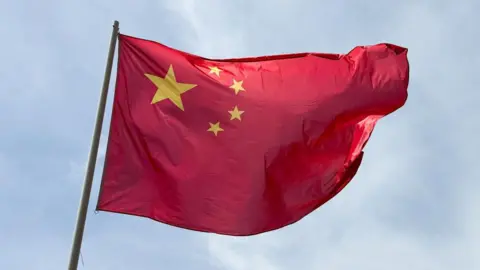China says MI6 recruited Chinese couple as spies
 Getty
GettyChina has accused the UK’s intelligence agency of recruiting a couple as spies - the latest in a string of tit-for-tat allegations between Beijing and the West in recent months.
According to the Ministry of State Security, the two Chinese government employees were successfully recruited after MI6 operatives exploited the man’s “strong desire for money”.
The man, named as Wang, then convinced his partner, named only as Zhou, to join him as a British spy, the ministry said.
The accusations come weeks after the UK charged two men with spying for China.
The men were accused of giving "articles, notes, documents or information" to a foreign state, while China has called the allegations "malicious slander".
Earlier this month, a former Royal Marine charged with assisting the Hong Kong intelligence service was found dead in the UK, police there said.
China did not reveal how it uncovered the case involving Mr Wang and Ms Zhou, saying only that it came after a "thorough investigation".
The case is still under investigation and Chinese officials did not say if the couple would be charged.
The BBC sought a response from the UK government, which said it would neither confirm nor deny claims relating to intelligence matters.
China’s Ministry of State Security alleged that MI6 started cultivating Mr Wang when he was studying in the UK under a Sino-British exchange programme in 2015.
The operatives took "special care" of him in the UK, such as inviting him to dinners and tours to better "understand his interests and weaknesses", the ministry alleged.
They befriended him on campus under the guise that they were alumnus, and got him to provide "paid consulting services".
Through Mr Wang the MI6 operatives also recruited Ms Zhou to spy on China, the country's Ministry of State Security claimed. They both had "core confidential roles" in an unnamed state agency, it added, without elaborating on what they did or where they worked.
"Wang was initially hesitant but could not resist [the operatives'] repeated persuasion, enticement and even coercion, and eventually agreed," the ministry said in a statement on WeChat.
"Under Wang's strong instigation, Zhou agreed to collect intelligence... and he and his wife became British spies."
It is unclear why Beijing has chosen to publicise this case, says Chong Ja-Ian, a scholar at Carnegie China. It could be making the case public as a form of retaliation, but Beijing has also arrested people for espionage in the past.
And without more information, it is difficult to ascertain the veracity of Beijing's claims, Dr Chong said.
"Sometimes these do not appear... The opacity of [the Chinese Communist Party] including its judicial system, especially when it comes to espionage cases, can make understanding the details of the case especially challenging," he added.
China's Ministry of State Security has been posting frequent updates on its official channel since it was launched in August.
In January, it warned its citizens against "exotic beauties" seeking to lure them into the hands of foreign spy agencies.
Among other things, it has also cautioned citizens against photographing military equipment and warned against organisations "recruiting aviation enthusiasts as volunteers" to transmit China's flight data to other countries.
